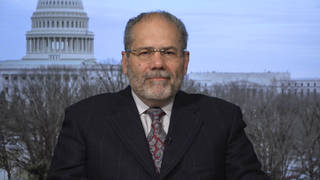
By Amy Goodman & Denis Moynihan
The passage of the American Rescue Plan Act of 2021, is not only a significant victory for President Joe Biden and the Democratic Party’s razor-thin majority in Congress. The $1.9 trillion COVID-19 relief package includes the much touted $1,400 checks to most Americans, an extension of the $300 per week supplemental unemployment benefit, billions in support to struggling state and tribal governments, and more. There is also an adjustment to the Child Tax Credit, which, on its surface, might appear to be just another tweak of our immensely complex tax code. In fact, the language tucked between pages 359-379 of the 628-page bill defines a profound shift in how we as a society confront poverty, much like the New Deal’s creation of Social Security did for the elderly following the Great Depression.
This temporary Child Tax Credit enhancement is expected to cut in half the number of children living in poverty in the U.S., especially helping children in communities of color. The Center on Poverty and Social Policy at Columbia University predicted H.R. 1319 would lift almost 14 million Americans out of poverty, including 5.7 million children. This anti-poverty initiative, increasing cash payments to poor families with no strings attached, while only temporary, signals a commitment to a more European-style social democracy. All the pain and death suffered during the past year of the pandemic just might give way to a renewed sense of shared struggle.
“This piece of legislation is absolutely going to change the lives of tens of millions of people in this country,” Stephanie Kelton, Professor of Economics and Public Policy at Stony Brook University and a former advisor to Senator Bernie Sanders said on the Democracy Now! news hour. “People for the first time are going to be able to pay all of the bills that they have, instead of trying to figure out which one to put off this month and how to try to catch up later.”
The expansion of the Child Tax Credit will deliver $3,600 per child under six years old, and $3,000 per child between 6 and 17 years old — an increase over the existing tax credit of $2,000 per child. Importantly, this new benefit is being referred to as “fully refundable.” A traditional tax credit is only available to families that owe in income taxes at least as much as the credit, so only wealthier taxpayers could access the full benefit. Now, all those below the income threshold will get the full credit in the form of direct payments from the government. They will not have to wait for their annual tax refund, sometime in 2022, as has been the practice. Instead, the bill instructs the Treasury Department to make periodic payments of the benefit directly to recipients, starting as soon as July. Thus, qualifying parents and guardians will see money in their pocket, to spend as they see fit.
“A lot of countries have programs like this,” Professor Kelton added. “They provide monthly support for families with certain income levels…Sending direct payment to families with children allows them to cover child expenses, which, of course, are incredibly high in this country.”
The COVID-19 relief bill passed without a single Republican vote. By comparison, the original $2 trillion CARES act, passed just a year earlier as the pandemic intensified its path of destruction across the United States, received unanimous bipartisan support in the Senate. Bipartisanship in the House was so complete that a roll call vote was dispensed with.
The American Rescue Plan Act, which is overwhelmingly popular with the public across the political spectrum, passed the Senate only through the use of the arcane reconciliation process, that allows budget-related bills to pass with a simple majority vote, rather than the Senate’s usual 60 vote requirement. Many Republicans, despite their vociferous opposition to the bill, are now taking credit for its many benefits. Mississippi Republican Senator Roger Wicker tweeted, “This funding will ensure small businesses can survive the pandemic by helping to adapt their operations and keep their employees on the payroll.” Wicker voted against the bill.
Childhood poverty can lead to devastating, long-term impacts on a child’s trajectory through life. It diminishes access to nutrition, education, good health, a safe environment and even the ability to play at the critical moment of early childhood development. As we emerge from the pandemic, the radical approach to fighting childhood poverty embedded in the American Rescue Plan will provide much needed support to those most in need. The true test will be whether its provisions can be made permanent, and we treat each vulnerable child as if she were our own.












Media Options